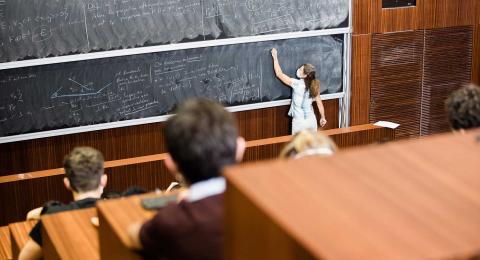The training focuses on acquiring cross-disciplinary skills to conceptualize and support the ecological transition of agricultural and food systems at the regional level.
The program offers training focused on acquiring cross-disciplinary skills and strong reflective abilities to think about and support the ecological transition of agricultural and food systems at the regional level.
The diversity of student profiles on the program, which includes equal numbers of students from the biological sciences, biotechnology, and the humanities and social sciences, facilitates observation and critical analysis.
The program has a dual purpose: “research” and “professional.”
The first semester is devoted to fundamental teaching and methodologies for understanding the field.
The second semester is an application during an internship.
Information
Skills
Students who have completed the training will enrich their initial course of study by acquiring a set of multidisciplinary knowledge in the field of agroecology and food security.
They will also be able to contextualize food models within the knowledge society, available technologies, and various usage scenarios suggested by actors in the field.
They will also have acquired individual and collective working methods through the training's strong emphasis on personal initiative and flipped learning.
In particular, they will acquire the following skills:
- Understanding and analyzing an agroecology model in relation to its ecosystem (territories, actors, environmental, economic, and social constraints, etc.).
- Acquire social science skills to report on situations rooted in a territory.
- Respond to a client's request (analyze, retranslate, study the situation, conduct interviews, analyze them, report the results, and make proposals, etc.).
- Know how to work independently and as part of a team (take initiative, share knowledge, rely on the team, etc.).
- Understand, analyze, and use scientific literature on a particular subject: know how to use databases, know how to compile a corpus of scientific texts, have a critical eye on literature, analyze sources, etc.
- Know how to compile different types of field data (qualitative interviews, ethnography, quantitative data, field notes, etc.), compare and analyze them in order to produce conclusive results.
- Adopt a transdisciplinary perspective on a subject of study (ecology, agronomy, sociology, political science, economics, etc.) without abandoning the disciplinary approach associated with one's original training.
Objectives
This program is structured around an analysis of socio-ecosystems, which are by definition territorial entities, where the dynamics of interactions between physical, biological, technical, economic, social, political, and cultural dimensions are treated without hierarchy. This objective requires positioning oneself at the interfaces between ecology, social sciences, and agricultural sciences.
The course includes a North/South reflection, which is essential in this era of globalization of environmental and food security issues.
Career Opportunities
Career prospects
Après Master + Doctorat : chercheur ou enseignant-chercheur
Chargé de mission environnement / biodiversité
Chef de projet environnement / biodiversité
Après un master : Chargé(e) d’études
Responsable application en produits alimentaires
Chargé de mission environnement
Chargé de mission développement durable
Chargé d'études environnement
Chargé d'études développement durable
Chargé de développement
Ingénieur d’études dans les domaines de la recherche
Chargé d’études technico-économiques, stratégiques, environnementales
Chargé de mission / Chargé d’études biodiversité, développement durable
Sous réserve de réussite au concours de la fonction publique, les diplômés pourront accéder à des postes d'ingénieur d’étude ou chercheur au sein d’un organisme national de recherche
Ingénieur.e d’études
Chargé·e de projet
Services agricoles, environnement ou développement durable, aménagement des collectivités ou services de l’Etat
Organisations et associations de développement agricole ou de protection/conservation de la nature
Bureaux d'études spécialisés dans l'évaluation des impacts environnementaux
Entreprises du secteur privé, dont production agricole
Responsable d'un service territorial
Chargé de projet et de développement territorial
Gestion de projets de développement durable
Chef de projet en développement durable et aménagement du territoire / aménagement régional
métiers de la recherche
enseignant.e-chercheur.se (après un doctorat)
Ingénieur de recherche
consultant
responsable de suivi et d’évaluation de projet
Coordination d’études en agence ou dans une institution de recherche
ingénieur d'études
Chargé·e d’études
Consultant·e
Further Study Opportunities
Master Agrosciences, Environnement, Territoires, Paysage, Forêt
Biologie-AgroSciences
Biodiversité, écologie et évolution
Master Biologie-AgroSciences
Master Biodiversité, écologie et évolution
Doctorat en écologie / évolution / fonctionnement des écosystèmes
Doctorat
Doctorat / PhD interdisciplinaire en Science de la durabilité (nombreuses disciplines possibles)
Thèse de doctorat
Les étudiants titulaires d’un M2 ont la possibilité de poursuivre dans la recherche en doctorat
Master de Sociologie
Master de Science politique
Ingénierie en agriculture et environnement naturel
Chargé·e d’études
Consultant·e
Fees and scholarships
The amounts may vary depending on the programme and your personal circumstances.
Admission Route
Capacity
Available Places
Target Audience and Entry Requirements
- Have a Master's degree in social sciences (political science, sociology, economics, geography, etc.) and an interest in food issues and the development of agroecology. Be able to understand technical issues related to agroecology.
- Have a Master's degree in biology, ecology, or agronomy. Be open to social sciences. Be able to read social science literature and acquire a way of thinking that differs from your original training.
Application Period(s)
From 15/05/2026 to 15/06/2026
Supporting documents
Compulsory supporting documents
List of post-secondary school studies mentioning exclusively the year, course, institution, average grade and your grade or distinction.
Motivation letter.
List of other masters requested (excluding Saclay).
All transcripts of the years / semesters validated since the high school diploma at the date of application.
Curriculum Vitae.
The application procedure, which depends on your nationality and your situation is explained here : https://urlz.fr/i3Lo.
Additional supporting documents
TOEIC.
Certificate of French (compulsory for non-French speakers).
VAP file (obligatory for all persons requesting a valuation of the assets to enter the diploma).
Supporting documents :
- Residence permit stating the country of residence of the first country
- Or receipt of request stating the country of first asylum
- Or document from the UNHCR granting refugee status
- Or receipt of refugee status request delivered in France
- Or residence permit stating the refugee status delivered in France
- Or document stating subsidiary protection in France or abroad
- Or document stating temporary protection in France or abroad.











